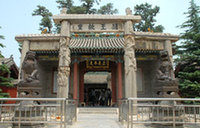Tibetan tongue
( China Daily/Xinhua ) Updated: 2014-03-04 08:00:24
|
A teacher gives a Tibetan language class at Gannan Tibet autonomous prefecture in Gansu province. Wu Tong / For China Daily |
In fact, the lack of new words is a cause for concern among Tibetan linguists.
|
|
"As the Tibet plateau is no longer isolated from the rest of the world, its language is updated with a rapidly expanding vocabulary of borrowed words," he says.
New lexicon
Genqub Tenzin is one of many Tibetan linguists working to preserve the language.
He is head of a government-run Tibetan textbook compilation committee that edits written work for primary and middle schools in Tibet as well as other Tibetan areas in Sichuan, Qinghai, Gansu and Yunnan provinces. Translation of borrowed words is an increasingly important job in the committee's editing.
"When we cannot find a Tibetan equivalent, we try to work out new phrases, or paraphrase the idea with existing Tibetan words," he says. "Transliteration is our last choice."
In one of their latest works, a Tibetan-Chinese-English dictionary of new words and terminologies, Genqub Tenzin and his trilingual team submitted more than 13,000 entries, including new Tibetan coinage for computer, mouse, web users and even microblog.
First published in 2006, the dictionary has lagged behind the development of technology and the influx of new words.
"There's a lot more to be done," says Genqub Tenzin. "We have to move faster in updating the Tibetan lexicon. Hopefully, we'll also promote standard Tibetan to replace the different dialects in different parts of Tibet and other Tibetan communities in western China."
|
|
|
|
|
|
|
|
























 Raymond Zhou:
Raymond Zhou: Pauline D Loh:
Pauline D Loh: Hot Pot
Hot Pot Eco China
Eco China China Dream
China Dream China Face
China Face





